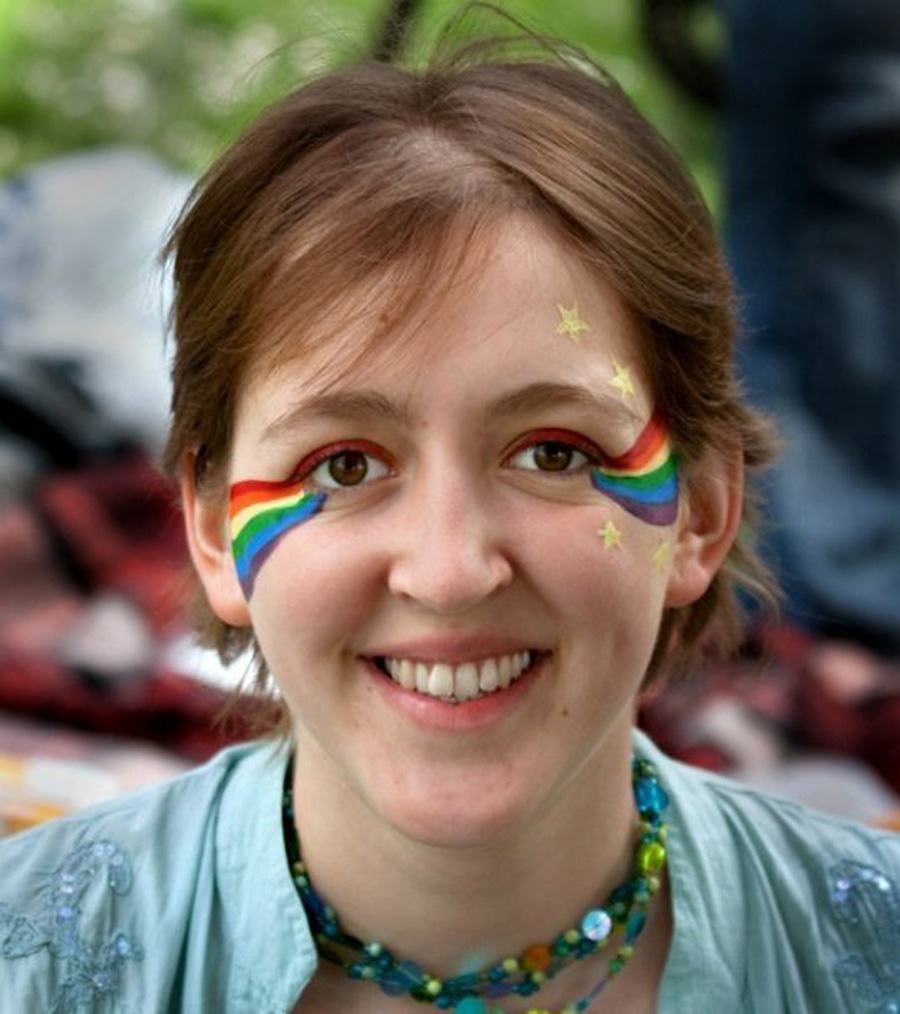By Ludi Valentine
I realized I was bi at 19, during my university’s LGBT Awareness Week (of all things!). I had not thought much about my sexuality before then. I came out immediately. At the time, I was two years into my first relationship: a long-term, monogamous, vanilla pairing with a man. Despite this, I was completely welcomed into the queer and questioning women’s group: there was nothing but complete friendliness and support for my coming out. Weekly coffee meets with a large bunch of young, queer women became a staple of my university life: whipped cream piled high on thick hot chocolate in the local Italian cafe, loud and raucous discussions about sex toys and feminism, groups perusing Diva (Europe’s leading lesbian and bi women’s magazine). I took on running the coffee meets during holidays, and often ended up chatting one-on-one with first-timers just coming out, or having just moved to the city.
Two years later, and that partner long gone, a friend took me to my first BiCon. Now, the UK in general isn’t very big on conventions: BiCon is one of the few alternative sexuality conventions that exists, and may be the largest. It’s been running for nearly 30 years and routinely brings in up to 500 attendees for a long weekend of workshops, discussions and socializing, and it is well-known in LGBT groups all over the UK. I knew none of this back then: I went in to find an absolute feast of alternative sexuality and relationship styles, and I attended every single sexuality-related workshop going. I learned about BDSM and ethical non-monogamy, as well as meeting more bisexuals than I ever had before. Many, like me, were relatively young and with little dating experience.
As well as fueling my thirst for knowing everything there is to know about alternative sexualities, BiCon was a gateway to my attending, and later organising, other events. The UK polyamory scene grew out of BiCon almost ten years ago, growing from an annual poly lunch to a PolyDay to an entire weekend unconference. Later that year, I attended my first PolyDay, and I recently took on running OpenCon. OpenCon is a weekend in the beautiful English countryside with an organic, participant-led programme that provides a space to discuss non-monogamy in more depth than is possible at shorter events, and it is an absolute joy to run. Last year saw people coming from Switzerland, Germany, Catalonia and all over the UK: it’s exhilarating and hugely rewarding to recreate the feeling of community and understanding that’s so familiar at BiCon in this new space.
Last year’s Bisexual Invisibility Report highlighted the dismal state of bisexual mental health, as well as discussing physical health and economic oppression. Other activists have pointed out the huge lack of bi-specific support among LGBT organisations, and virtually no state funding for bi-specific organisations. I’ve seen first-hand the importance of the support network provided by a thriving bi community, and I hope to help support the community through organising events and teaching. This year, I’m running the UK’s first poly speed dating event (it’s queer-inclusive too, and a large bi contingent are attending) and the first BiFest in Cambridge, UK, a one-day event of bi-focused workshops and socialising. It’ll be in our local Quaker meeting house, in recognition of forty years of bi organising since an impromptu workshop on bisexuality at a Quaker AGM spilled into five rooms over two days and produced the Ithaca Statement On Bisexuality.
My bisexuality informs and motivates a huge amount of my work. I’m interested in sexuality education, in providing safer spaces in which alternative sexualities can exist and be discussed, and in educating professionals in providing more inclusive work. Last year, I worked in a female-focused, queer-friendly sex toy shop, where I particularly valued being able to talk het couples through opening their sex life to queerer kinds of sex: it always made my day when they left with a new strap-on! I also taught workshops there, routinely amazed that straight-laced, middle-aged het couples would come and pay to listen to this young, short-haired, anti-capitalist queer sex geek talk about the G-spot, impact play or anal sex.
Recently, I taught students about queer-positivity and was delighted to see that many of them already understood concepts such as bisexual erasure and non-binary gender, having read queer and feminist blogs. This year, I’ve started facilitating a five-week discussion course on sexuality for queer women, and was pleased to find in the first session that the majority of the group describe themselves as not monosexual. Bisexual identities and experiences are everywhere, and it’s clear that they must be acknowledged as such to provide more useful and relevant services.
I also write about dating, sex toys and feminism. I call myself queer, and bi, and I’m openly non-monogamous and kinky. I’ve found that my cheerful noisiness around sexuality prompts strangers and acquaintances to open up, tell me things about their experiences and ask my advice, and that’s quite amazing and humbling. I feel very trusted, and it’s a reminder that, as well as organising events, writing and teaching, an extremely important part of my activism is simply being out, open, and acting as a listening and conversational ear to questioning people. That’s a fundamental, and it’s a piece of wisdom I hope to remember.
Ludi Valentine runs things and then writes about them. She lives in London and at siliconevalley.tumblr.com.
Featured image: Photo by Jelena Aleksic

